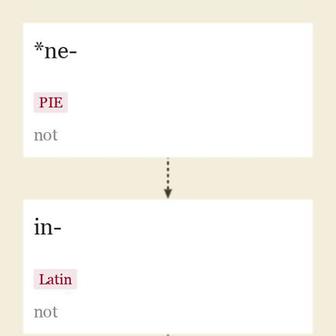Words related to impervious
word-forming element meaning "not, opposite of, without" (also im-, il-, ir- by assimilation of -n- with following consonant, a tendency which began in later Latin), from Latin in- "not," cognate with Greek an-, Old English un-, all from PIE root *ne- "not."
In Old French and Middle English often en-, but most of these forms have not survived in Modern English, and the few that do (enemy, for instance) no longer are felt as negative. The rule of thumb in English has been to use in- with obviously Latin elements, un- with native or nativized ones.
Proto-Indo-European root forming prepositions, etc., meaning "forward," and, by extension, "in front of, before, first, chief, toward, near, against," etc.
It forms all or part of: afford; approach; appropriate; approve; approximate; barbican; before; deprive; expropriate; far; first; for; for-; fore; fore-; forefather; foremost; former (adj.); forth; frame; frau; fret; Freya; fro; froward; from; furnish; furniture; further; galore; hysteron-proteron; impervious; improbity; impromptu; improve; palfrey; par (prep.); para- (1) "alongside, beyond; altered; contrary; irregular, abnormal;" paradise; pardon; paramount; paramour; parvenu; pellucid; per; per-; percent; percussion; perennial; perestroika; perfect; perfidy; perform; perfume; perfunctory; perhaps; peri-; perish; perjury; permanent; permeate; permit; pernicious; perpendicular; perpetual; perplex; persecute; persevere; perspective; perspire; persuasion; pertain; peruse; pervade; pervert; pierce; portray; postprandial; prae-; Prakrit; pre-; premier; presbyter; Presbyterian; preterite; pride; priest; primal; primary; primate; primavera; prime; primeval; primitive; primo; primogenitor; primogeniture; primordial; primus; prince; principal; principle; prior; pristine; private; privilege; privy; pro (n.2) "a consideration or argument in favor;" pro-; probably; probe; probity; problem; proceed; proclaim; prodigal; produce; profane; profess; profile; profit; profound; profuse; project; promise; prompt; prone; proof; proper; property; propinquity; prophet; prose; prostate; prosthesis; protagonist; Protean; protect; protein; Proterozoic; protest; proto-; protocol; proton; protoplasm; Protozoa; proud; prove; proverb; provide; provoke; prow; prowess; proximate; Purana; purchase; purdah; reciprocal; rapprochement; reproach; reprove; veneer.
It is the hypothetical source of/evidence for its existence is provided by: Sanskrit pari "around, about, through," parah "farther, remote, ulterior," pura "formerly, before," pra- "before, forward, forth;" Avestan pairi- "around," paro "before;" Hittite para "outside of," Greek peri "around, about, near, beyond," pera "across, beyond," paros "before," para "from beside, beyond," pro "before;" Latin pro "before, for, on behalf of, instead of," porro "forward," prae "before," per "through;" Old Church Slavonic pra-dedu "great-grandfather;" Russian pere- "through;" Lithuanian per "through;" Old Irish ire "farther," roar "enough;" Gothic faura "before," Old English fore (prep.) "before, in front of," (adv.) "before, previously," fram "forward, from," feor "to a great distance, long ago;" German vor "before, in front of;" Old Irish air- Gothic fair-, German ver-, Old English fer-, intensive prefixes.
Proto-Indo-European root meaning "to go, move, transport in a vehicle."
The root wegh-, "to convey, especially by wheeled vehicle," is found in virtually every branch of Indo-European, including now Anatolian. The root, as well as other widely represented roots such as aks- and nobh-, attests to the presence of the wheel — and vehicles using it — at the time Proto-Indo-European was spoken. [Watkins, p. 96]
It forms all or part of: always; away; convection; convey; convex; convoy; deviate; devious; envoy; evection; earwig; foy; graywacke; impervious; invective; inveigh; invoice; Norway; obviate; obvious; ochlocracy; ogee; pervious; previous; provection; quadrivium; thalweg; trivia; trivial; trivium; vector; vehemence; vehement; vehicle; vex; via; viaduct; viatic; viaticum; vogue; voyage; wacke; wag; waggish; wagon; wain; wall-eyed; wave (n.); way; wee; weigh; weight; wey; wiggle.
It is the hypothetical source of/evidence for its existence is provided by: Sanskrit vahati "carries, conveys," vahitram, vahanam "vessel, ship;" Avestan vazaiti "he leads, draws;" Greek okhos "carriage, chariot;" Latin vehere "to carry, convey," vehiculum "carriage, chariot;" Old Church Slavonic vesti "to carry, convey," vozŭ "carriage, chariot;" Russian povozka "small sled;" Lithuanian vežu, vežti "to carry, convey," važis "a small sled;" Old Irish fecht "campaign, journey," fen "carriage, cart;" Welsh gwain "carriage, cart;" Old English wegan "to carry;" Old Norse vegr, Old High German weg "way;" Middle Dutch wagen "wagon."

